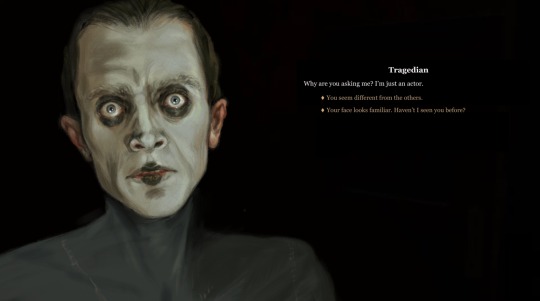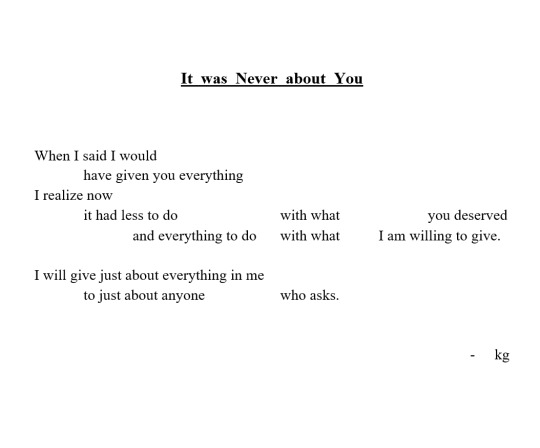#alt-lit
Text
go with the favor of the southern winds (lips of ashes)
the unknown speaks through me
these our last words, paradise
be it at a willingness to die,
nor a fealty to light.
i'll never know which way to go
if these blessings of fog hide our lies,
like i was born to perish
gone to dust before i begun,
as if the words i say were of forgotten tongues
never the lesser to speak words of faith.
i should know better.
i always knew i was the weaker one,
yet i'll go further than anyone else
no fear.
like the ghosts following me are giving guidence,
those speak to me with that certain illumination
as if i'll never know these winds that gale at us.
where was i?
never mind.
***
cold cold wind
bear with me these nights
that we might stoke a fire bright
and let the heavens envy our might.
for we forge and toil,
bring light to oil
and never will go again
to this midnight sun,
our bleak spectre in the sky.
you shine like a beacon.
cold cold wind
bear with me, we might
fight this apparition with our gifts
deny anything majorly engulfed,
we'll fuel off of the fumes.
***
we've seen where this road goes,
we know the inevitable spot it travels to.
i'll go anyway
like this cold, scared kid
i'll go away
like they cant see me
or feel what i know,
i'll go.
never to know where i was
i'll go endlessly to find
a way to go
as if the words i spoke flowed out of the winds wildly before it bellowed my mouth.
i should know better.
***
please know we are of ether
fleeting wisps on the wind
like the others were blowing right past
us as the leaves in the sky,
a wonderous notion.
please let me see the sun
that i might heat the cold
and warm my wings
the fates are at a crux,
the wind has never been better to fly.
and again you'll see it
with your own eye
a glimpse into the unknown,
know that you are not alone.
for we speak the ways of the winds,
and i should know better.
2 notes
·
View notes
Text
I'm always on-guard against conservatism in my thought. I think of myself as left in my sympathies; I also know I'm at the age where youthful commitments morph, or break under the weight of compromise. Like the ones involved in life in the American professional-managerial middle class. Entry into a certain income bracket, the structure and demands of day-to-day life, the pieces of practical work, like the management of bills, that are necessary to stay afloat, and the many entertainments you can use to while away the hours you don't devote to a job—they all serve to narrow one's horizons; it's so easy to end up stranded in the cul-de-sac of your stupid individual existence. I also have some very rudimentary, instinctive associations I've carried with me since youth. Just as conservatism is bad—because retrograde, oppressive, contingent on baseline assumptions about the self-interest of human character to which I'm not willing to commit—"avant-garde" is good, because it challenges that conservatism. So it was interesting to come upon Dean Kissick's contribution to the feature "What Happened to the Avant-Garde?" in the latest issue of The Drift and think that, based on my last post, he'd probably put me in the arrière-garde—which favors what is past because it's a means to reject the present and future—while he locates the avant-garde in online communities at which I mostly look askance: "schizo-affect" Substacks, the work of Honor Levy, and other venues that seem to thrill to the possibilities that AI and machine learning technologies might hold for art and human subjectivity.
In these communities—products of an era of the Internet that's a little after the one I occupied, as a millennial closer to the middle than the end of that generation's span—"individual subjectivity," as Kissick puts it, "was forsaken in favor of pseudonymity, the impersonation of others, collective authorship, and collaborations with software." In isolation, I'm cool with each of these things except for the last one. Of course, there's no guarantee that any of them make for good art or lasting contributions to it—the title of Kissick's entry is "Senseless Babble," and he himself grants that "there's a fine line between nonsense doggerel and aesthetic innovation here, [as is] always the case with avant-gardes." And it's really too simplistic to say that the avant-garde generally is automatically good. Avant-gardes can be regressive; ours is pretty likely to be, as John Ganz wrote last year:
They pride themselves in being retrograde or blithely unaware along a number of axes, from declaring, as a last ditch Bohemian provocation, their fealty to conventional bourgeois values; their preoccupation with adolescence; appropriation of lower-brow or conservative religious themes; their affectation of not being the product of arts education but rather the native denizens of the dark underbelly of internet message boards; their deliberate cultivation of a sense of mental debility or confusion with results that less like Dadaist or Futurist experimentation and more just senseless chatter and maudlin ecstasy....
There's something akin to an accelerationist's empty zeal, too, in Kissick's piece, in claims like the one that the timeline has surpassed modernist poetry as a document of the collective unconscious and human subjectivity within it. A love for what is novel and ostensibly a challenge to what is simply because it's novel or a challenge. A love for form that disregards content. And a love that likely mistakes a mere turn of the wheel for something truly new and unprecedented. Turn the dial back ten or fifteen years and you'd find people saying much the same about alt-lit—though likely less effusively, jadedness and alexithymia being characteristic of that style and its partisans where volubility, profusion, and mania seem hallmarks of this one. We're saying something new, we thought then. And uneasy in the background hung the question: who knows if it's meaningful. (The answer, predictably: not very.) (But at least the question was there.)
Still, we're all here trying to articulate—to make something new, as in valuable, because it speaks to what only we can speak to.
But then there's Lisa Robertson in her novel The Baudelaire Fractal, which I just finished. The novel is another Künstlerroman, the story of an artist's formation, and over the course of her literary apprenticeship, the protagonist decides that, as she puts it, "I was no avant-gardist; I had no interest in abolishing grammar. Rather, I studied it, in a casual way..." Perhaps that's where my own allegiances lie—in working with the world as it is rather than abolishing it; exploring the possibilities it holds without tipping into what I think will degrade it, such as technologies like AI; most crucially, tempering the excitement of the new with some sense of what the new might be worth... Robertson's narrator, for her part, determines that her literary project will entail work with the sentence: "By what profound calculations," she wonders, "could the contours of the sentence be transformed, and what would I then become?"
4 notes
·
View notes
Text
I'm just trying to become someone who the child inside me will not hate. I'm trying to be everything she needed and did not receive. She is so lonely still. It's not fair that she is so lonely still.
Nikita Gill
7K notes
·
View notes
Text

Marc Lamont Hill and Mitchell Plitnick, from Except for Palestine: The Limits of Progressive Politics
#marc lamont hill#mitchell plitnick#except for palestine: the limits of progressive politics#words#essays#lit#palestine#free palestine#on zionism#typography#id in alt text
3K notes
·
View notes
Text

may 8. papà forbade mirrors in the house lest we fall victim to vanity.
#dracula#dracula daily#jonathan harker#count dracula#bram stoker#gothic literature#gothic lit#goth lit#goth lit art#i figured out alt text everyone clap
4K notes
·
View notes
Text


some environment practice !! _(:з)∠)_
#froyoscribbles#dc#jason todd#bruce wayne#id in alt text#sorry every background i draw is either a convenience store or darkly lit city theyre my besties.....😭
2K notes
·
View notes
Link
In this new Longreads essay, Megan Marz asks: why does the literary world still hold online writing at arm’s length?
While it’s become banal to observe that online life is fully enmeshed with the rest of the world, an imaginary curtain separates online writing from the rest of U.S. literature. It’s time to take that curtain down.
People like to say the internet speeds reading up, but a personal blog, read in real time, can slow a story’s pace down to the timescale of life; the thickest book in existence can be read in less calendar time. Not even the author knew when a blog would end, which is what made it feel so alive.
Read Megan Marz’s “Poets in the Machine” on Longreads.
832 notes
·
View notes
Text

PSA for all who hate censorship and live in Florida!
Banned Books USA is offering a free (only pay for shipping) commonly-banned/challenged books in FL. These range from kids to adults, fiction, poetry, and nonfiction. They'll keep sending them as long as they can afford it, so please donate if you have the means, and share with those who could benefit from it, especially educators and those who care for kids.
Here are just a few from the list that I recommend:
Toni Morrison, Beloved and The Bluest Eye
Marcus Ewert, 10,000 Dresses
Yaa Gyasi, Homegoing
Junji Ito, The Art of Junji Ito: Twisted Visions
Alison Bechdel, Fun Home
Jacqueline Woodson, Red at the Bone
Jonathan Kozol, Savage Inequalities: Children in America's Schools
Mariko & Jillian Tamaki, This One Summer
Tillie Walden, Spinning
Kazuo Ishiguro, Never Let Me Go
Kurt Vonnegut, Slaughterhouse-Five
Marjane Satrapi, Persepolis
#mine#book rec#found this via electric lit's newsletter(which i also recommend) and wanted to share!#described#id in alt text
581 notes
·
View notes
Text


conrad veidt would make a great tragedian i think
#pathologic#conrad veidt#artwork#scopophobia#id in alt text#if any of you actually benefit from IDs id be very grateful to know if you prefer them in the alt text or in the post body!#anyway :D HIM#this is caligari-era connie obviously. i was saying this the other day but later connie would be a great saburov i think#i cant decide if i prefer the idea of him playing every tragedian or him being a very obviously incongruous tragedian who has just painted#his face to look like a mask and is hoping nobody will notice#also please ignore that the lighting doesnt make sense on the second one i used reference images lit from two different angles and didnt#notice until i had rendered it out because i always flip my canvas so often and im too lazy to fix it#anyway (part 2) i am still on my conrad veidt autism explosion and i am having a great time. i am having so much fun. i love he#i hope you are all well too my friends! term just finished for me so i am back hoam :D yaaay
377 notes
·
View notes
Text

— Wendy Cope, Spring Onions
1K notes
·
View notes
Text

alice hoffman practical magic
kofi
#id in alt text#alice hoffman#practical magic#quotes#on self#on life#american lit#american literature#fragments
319 notes
·
View notes
Text

It was Never about You //
3 of 3: Poems From the First Evening I've Spent Alone in Over a Month
#mine#spilled ink#twcpoetry#writerscreed#twcwriting#tellherium#excerpt from a book i'll never write#alt lit#blossomfully#prose poetry#spilled words#love poem#heartbreak#someone you loved#someone i loved#love#writers on tumblr#twcpoets#drunk poetry#first evening
785 notes
·
View notes
Text


You're not the only one who survived.
#the SADDEST of eyes#I know the game keeps us in Cal's perspective by staying over his shoulder - but I want to see everyone's faces all the time so#this scene is so well lit too big props to the Jedi lighting team#star wars jedi survivor#jedi survivor#jedi survivor spoilers#bode akuna#cal kestis#alt angle cutscene
331 notes
·
View notes
Text
Sometimes I think about how beautiful it is that humans sing despite it all. That through suffering, we still sing. How even on the worst of days in the world, there were still people singing. The way a mother sings a lullaby to her crying baby to soothe her. Or the way sailors sang sea shanties out even on choppy oceans to build a sense of familiarity and camaraderie as they worked. Or how even in the depths of the earth, coal miners sing. Isn’t that the most beautiful thing about the human spirit? That we found a way to reach each other in the darkness. To let each other know through song, that do not worry, I am here. Let us sing together and ease each others fears.
- Nikita Gill
#spilled ink#writing#poetry#poem#lit#creative writing#literature#words#spilled thoughts#alt lit#dark academia#light academia#humanity#humans
2K notes
·
View notes
Text

Palestine: A Socialist Introduction, ed. Sumaya Awad and Brian Bean
#palestine: a socialist introduction#sumaya awad#brian bean#words#lit#essays#palestine#on zionism#id in alt text
600 notes
·
View notes
Text


Did he who made the Lamb make thee?
-
this is heavily referencing Jacques Fabien Gautier d'Agoty's "Anatomical Angel" illustration, it's also inspired by William Blake's art, specifically "The Great Red Dragon" and his poem "The Tyger"
#art#painting#original character#artists on tumblr#wolfgang#artistic nudity#id in alt#happy peeled wolfgang wednesday once again!!!!!!§#very happy to have this finished!!#i will be smart and not write an essay in the tags abotu this and instead write a separate post so look out for that#i know the tyger is like lit 101 but ive always really loved the poem and the progression of it. it just stuck with me for so long#robot fuckers i hope you find this
177 notes
·
View notes